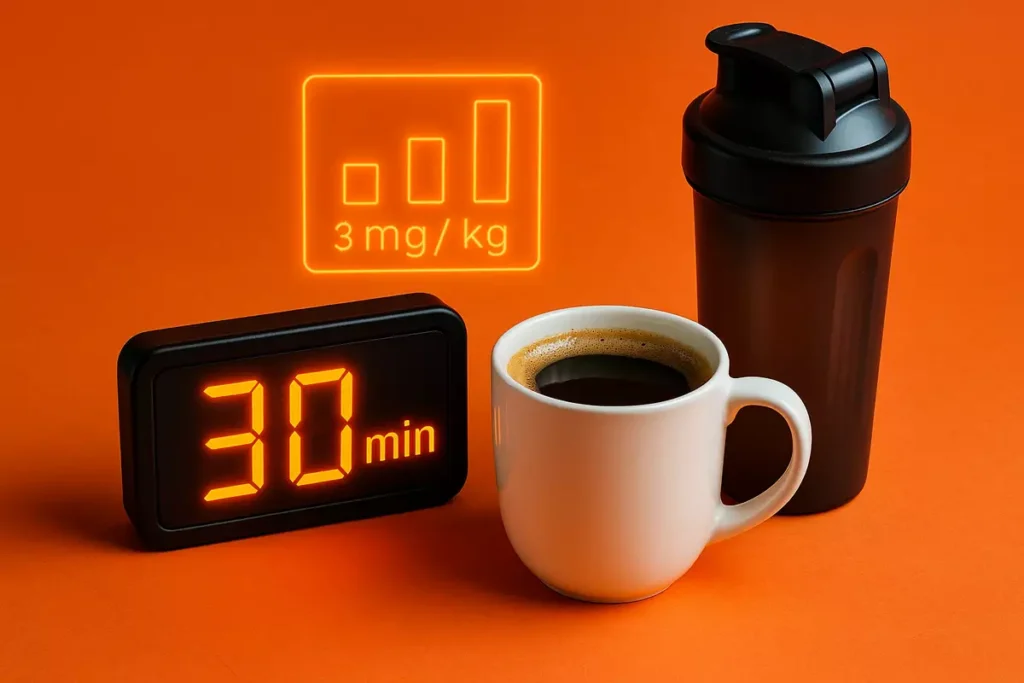Caffeine isn’t just for waking you up in the morning — it can be a game-changer in the gym, on the track, or during competition.
From sharper focus to delayed fatigue, athletes around the world use caffeine to push past limits and perform at their best.
But does it really work for everyone? And how can you use it safely to get the most out of your training sessions? Let’s break it down.
Table of contents
Does Caffeine Improve Performance?
Yes — caffeine can significantly improve athletic performance for most people.
It enhances focus, reduces perceived effort, and increases endurance. In my own training, caffeine has often been the difference between a sluggish session and a high-energy workout.
Whether you’re lifting heavy, running long distances, or doing HIIT, the right dose at the right time can give you a noticeable boost. You can explore more on caffeine’s benefits for strength and endurance for a deeper dive into the science.
How Caffeine Works in the Body

Caffeine stimulates your central nervous system by blocking adenosine receptors — the chemicals that make you feel tired.
This helps you feel more alert and reduces the perception of fatigue. It also increases adrenaline, which can enhance strength, endurance, and reaction time.
In practice, this means you can train harder before hitting that mental “wall.” When I drink a strong coffee about 40 minutes before a workout, I often find myself sharper and more motivated. My sets feel lighter, and I push through without constantly checking the clock.
You can learn more about how caffeine impacts endurance vs. strength training in specific sports contexts.
Performance Benefits for Different Athletes
Endurance Sports
For runners, cyclists, or swimmers, caffeine helps maintain pace and delay exhaustion.
I remember doing a 10 km run with my friend Liam. We both had coffee beforehand, and by the halfway mark, I realized I was still keeping my target pace without the usual mental struggle.
Strength and Power Training
Caffeine sharpens focus and can increase the number of reps or the weight you lift.
Training with my friend Marco before a bench press PR attempt, we both took caffeine and ended up breaking our personal bests. For me, it felt like my muscles were “awake” and my mind was locked in.
High-Intensity and Team Sports
In sports requiring bursts of speed and focus, like basketball or HIIT, caffeine can improve reaction time and decision-making.
However, overdoing it may cause jitters, which can hurt precision. If you want to understand how caffeine timing impacts focus and mental clarity, there are strategies to improve the benefits while minimizing the negatives.
Best Timing and Dosage for Results

The sweet spot is generally 3–5 mg of caffeine per kilogram of body weight, taken about 30–45 minutes before training.
For me, that’s one strong coffee. Morning sessions work best with coffee for a smooth, steady boost. For short-notice sessions, a pre-workout supplement can kick in faster.
I avoid caffeine late in the day to protect my sleep — poor rest will cancel out any performance benefits. For more on this, see how caffeine affects sleep and evening workouts.
Also, whether you should take caffeine with or without food before the gym can influence both its speed and strength of effect.
Potential Side Effects and Safety Tips
Too much caffeine can lead to jitters, elevated heart rate, stomach discomfort, and disrupted sleep.
Once, I made the mistake of having two strong coffees before HIIT, and my heart rate spiked too early, forcing me to stop halfway.
From coaching experience, I’ve seen huge differences in tolerance. Sofia, a recreational runner, felt energized with just 100 mg, while James, a competitive powerlifter, needed 300 mg for the same effect.
Start low, test your tolerance, and increase slowly if needed. The safe dosage guidelines for athletes can help you find your sweet spot.
And if fat burning is part of your goal, it’s worth learning about caffeine’s role in metabolism and fat burning.
Final Takeaway – Is Caffeine Worth It for You?
For most athletes, caffeine is an effective, affordable, and easily accessible performance booster. The key is to use it strategically — the right amount, at the right time, for the right workout.
If you’re already tired, have high blood pressure, or train late at night, be cautious. I once worked with Elena, who trained at 9 PM. Caffeine gave her great workouts, but her sleep suffered badly, so we switched her intake to mornings only.
If you experiment with timing and dosage, you’ll likely find a caffeine routine that helps you perform better without unwanted side effects.
When used wisely, caffeine isn’t just a morning pick-me-up — it can be a powerful training ally that supports both performance and results.



Leave a Reply